An introduction to poetry comics edited by Chrissy Williams & Tom Humberstone turns out to be something of a revelation for Richie McCaffery
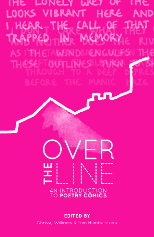 Over the Line: An Introduction to Poetry Comics
Over the Line: An Introduction to Poetry Comics
Edited by Chrissy Williams & Tom Humberstone
Sidekick Books, 2015
ISBN 978-1-909560024
£15
This book is a fascinating introduction to a hybrid medium that is new to me, but according to the scholarly yet completely accessible series of ‘introductions’ to this book, has existed since early New York School experiments in the 1960s when poets and comic-book artists began to collaborate. On the back-cover is an enthusiastic endorsement from Alan Moore (V for Vendetta, From Hell, Watchmen) celebrating the arrival of this book as the perfect marriage of two forms ‘both admired for their rhythm and sense of timing’. As far as blurbs go, it is hard to disagree with what Moore says. As you open this book, take it in and enjoy it, you feel as if a special event is unfolding in front of you. The experience is not just an aesthetic or intellectual one; this book is also instructive and provides you with a good ‘further reading’ list. One particular strand of ‘poetry comics’ I am interested in is their ability to possibly break up the traditional, and typically Western, narrative form, where the reader/ looker is guided very strongly in a set sequential pattern and the scope for interpretation is limited. In Over the Line you are actively encouraged to break from that urge / expectation on certain occasions. In this regard, I especially enjoyed the town-ballad feel of Amy Key’s (poetry) and Rob VonRamm’s (art) ‘Haunted’, where image and poem complements each other without either taking precedence and the reader/looker is allowed to let their eyes wander quite freely:
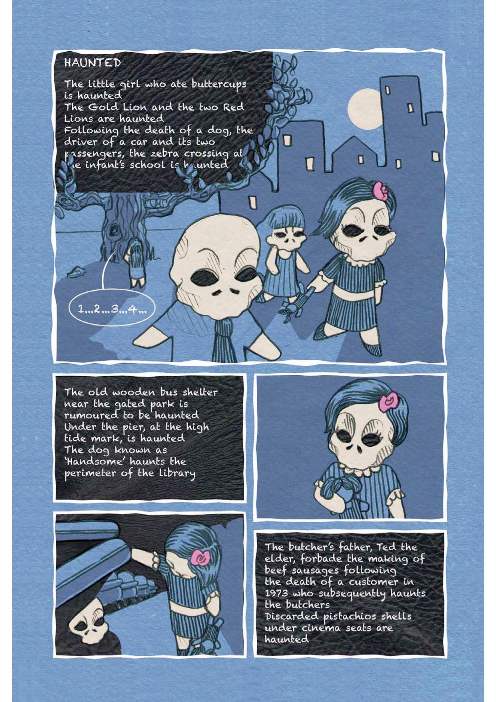
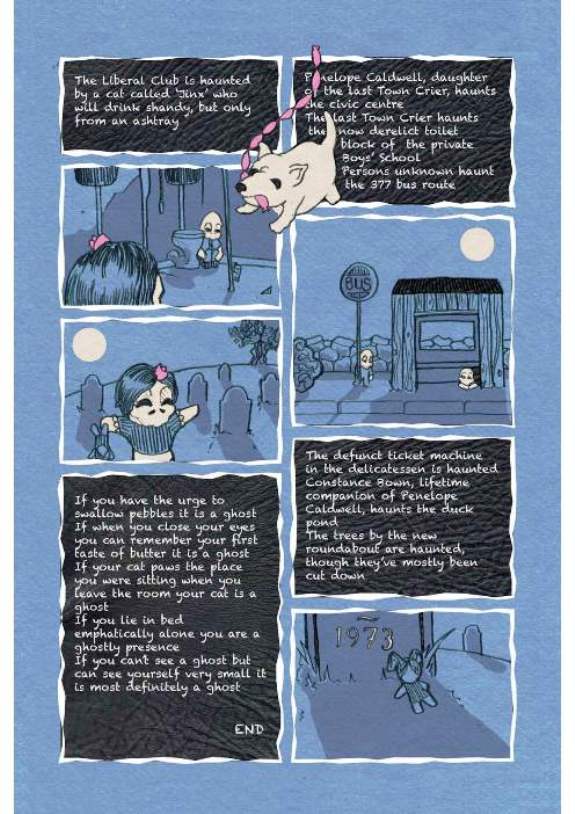
Image credit: ‘Haunted’ by Amy Key and Rob VonRamm
One of my favourite discoveries was the work of David Troupes, who is represented with ‘The Hills’. Troupes is one of the artists in this book who is also a poet, and the writing and imagery are equally beautiful. Again, there is no feeling that either medium is being led by the other; instead both forms bring something unique that creates a greater ‘whole’ than the sum of its parts. In ‘The Hills’ a speaker, reminiscing about his Grandfather, tries to burden a little bird with all of his poignant memories, but the bird is a free agent and simply flies off through the hills as he speaks, returning to the branch beside the speaker, marking the distance between the natural world and the human world, with all its emotional baggage:
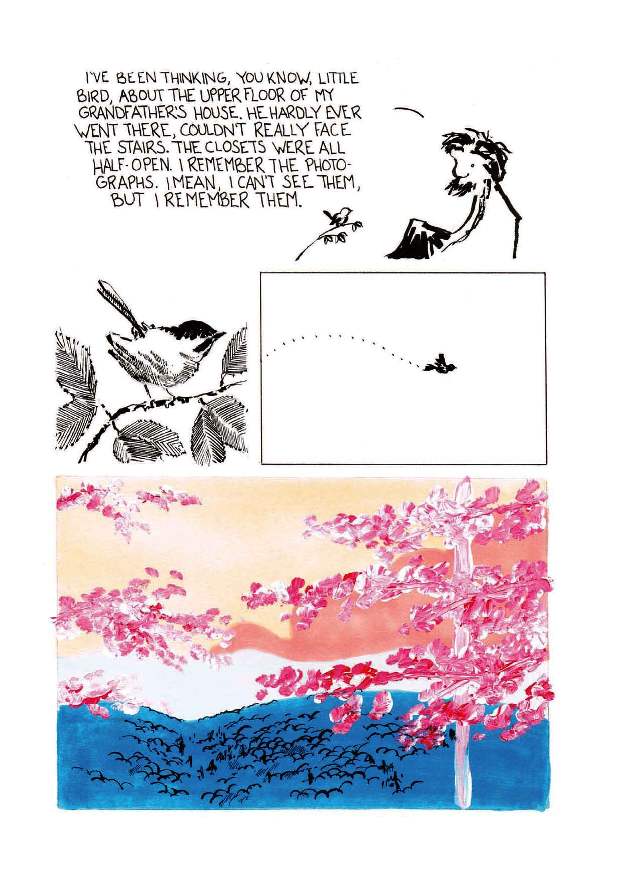
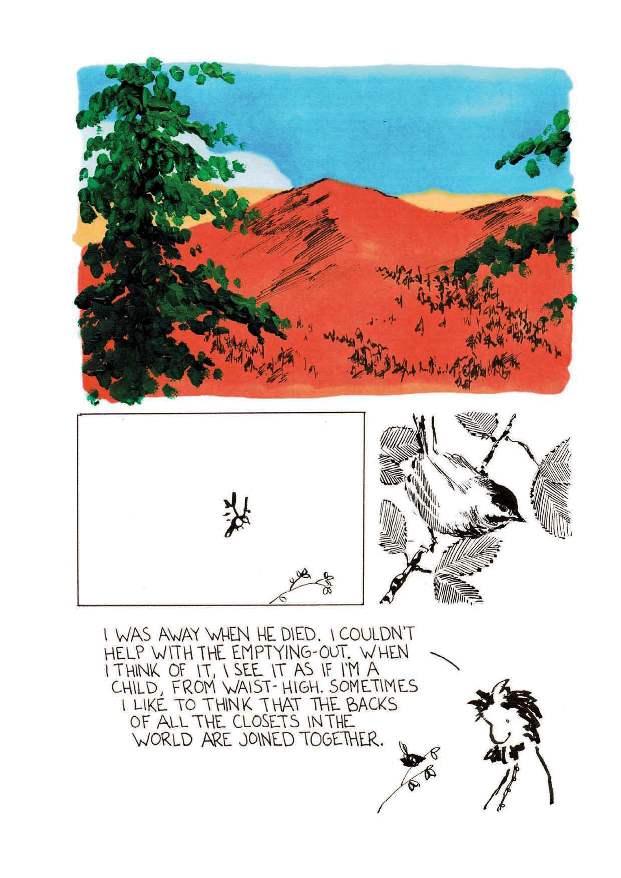
Image credit: ‘The Hills’ by David Troupe
The title of this collection is also worth remarking on. Over the Line has militaristic implications for me, of sticking your head above the parapet; and in many ways this collection is about forcefully and bravely launching a new hybrid form, of teams of poets and artists putting their work out there, which is something I can only salute and welcome. Take, for instance, Emix Regulus’s ‘Protoliths’ which operates as a visual metaphor for how our lives are shaped by stress and pressures (like that of a protolith being turned into metamorphic rock) while at the same time we also have as many choices to make as ‘stones on a beach’. There are many poets who have tried hard to bring together poetry and science in a mutually complementary way, but few poets have put their message across quite so strikingly, directly and vividly as this:
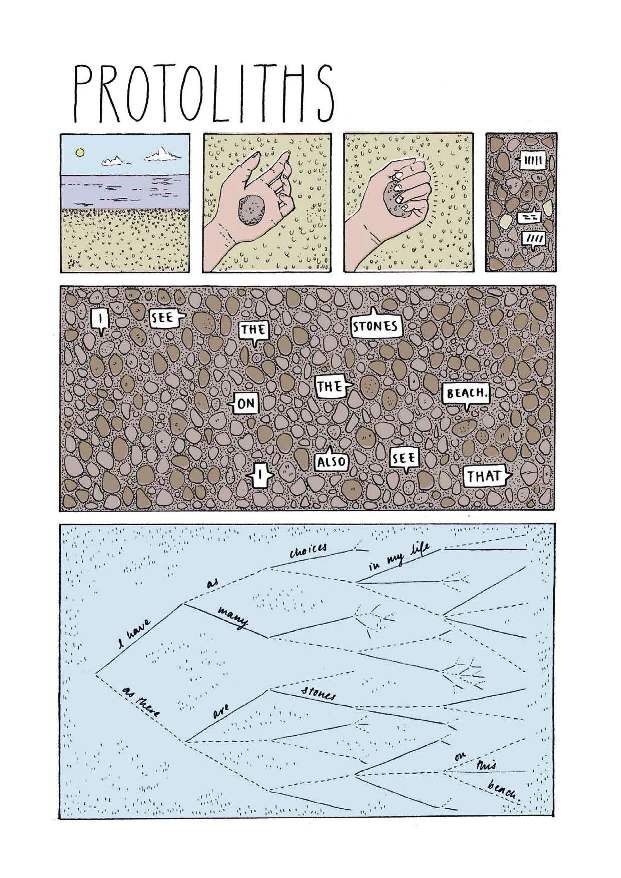

Image credit ; ‘Protoliths’ by Emix Regulus
An introduction to poetry comics edited by Chrissy Williams & Tom Humberstone turns out to be something of a revelation for Richie McCaffery
Edited by Chrissy Williams & Tom Humberstone
Sidekick Books, 2015
ISBN 978-1-909560024
£15
This book is a fascinating introduction to a hybrid medium that is new to me, but according to the scholarly yet completely accessible series of ‘introductions’ to this book, has existed since early New York School experiments in the 1960s when poets and comic-book artists began to collaborate. On the back-cover is an enthusiastic endorsement from Alan Moore (V for Vendetta, From Hell, Watchmen) celebrating the arrival of this book as the perfect marriage of two forms ‘both admired for their rhythm and sense of timing’. As far as blurbs go, it is hard to disagree with what Moore says. As you open this book, take it in and enjoy it, you feel as if a special event is unfolding in front of you. The experience is not just an aesthetic or intellectual one; this book is also instructive and provides you with a good ‘further reading’ list. One particular strand of ‘poetry comics’ I am interested in is their ability to possibly break up the traditional, and typically Western, narrative form, where the reader/ looker is guided very strongly in a set sequential pattern and the scope for interpretation is limited. In Over the Line you are actively encouraged to break from that urge / expectation on certain occasions. In this regard, I especially enjoyed the town-ballad feel of Amy Key’s (poetry) and Rob VonRamm’s (art) ‘Haunted’, where image and poem complements each other without either taking precedence and the reader/looker is allowed to let their eyes wander quite freely:
Image credit: ‘Haunted’ by Amy Key and Rob VonRamm
One of my favourite discoveries was the work of David Troupes, who is represented with ‘The Hills’. Troupes is one of the artists in this book who is also a poet, and the writing and imagery are equally beautiful. Again, there is no feeling that either medium is being led by the other; instead both forms bring something unique that creates a greater ‘whole’ than the sum of its parts. In ‘The Hills’ a speaker, reminiscing about his Grandfather, tries to burden a little bird with all of his poignant memories, but the bird is a free agent and simply flies off through the hills as he speaks, returning to the branch beside the speaker, marking the distance between the natural world and the human world, with all its emotional baggage:
Image credit: ‘The Hills’ by David Troupe
The title of this collection is also worth remarking on. Over the Line has militaristic implications for me, of sticking your head above the parapet; and in many ways this collection is about forcefully and bravely launching a new hybrid form, of teams of poets and artists putting their work out there, which is something I can only salute and welcome. Take, for instance, Emix Regulus’s ‘Protoliths’ which operates as a visual metaphor for how our lives are shaped by stress and pressures (like that of a protolith being turned into metamorphic rock) while at the same time we also have as many choices to make as ‘stones on a beach’. There are many poets who have tried hard to bring together poetry and science in a mutually complementary way, but few poets have put their message across quite so strikingly, directly and vividly as this:
Image credit ; ‘Protoliths’ by Emix Regulus
By Michael Bartholomew-Biggs • art, books, drawing, poetry, year 2016 0 • Tags: art, books, drawing, poetry